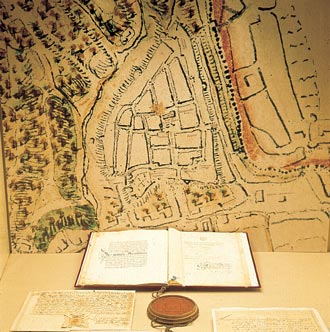Permanent Display 20. The New System of Municipal Government
 In the late 16th and early 17th centuries, the royal free city on Gradec Hill was an impoverished town. Hit by wars, the plague and earthquakes, it also suffered from frequent fires. Another affliction was internal strife, which usually reached its climax during the election of the town magistrate. It therefore became necessary to change the system of medieval privileges.
In the late 16th and early 17th centuries, the royal free city on Gradec Hill was an impoverished town. Hit by wars, the plague and earthquakes, it also suffered from frequent fires. Another affliction was internal strife, which usually reached its climax during the election of the town magistrate. It therefore became necessary to change the system of medieval privileges.
With the support of the former governor (ban) of Croatia, Toma Erdödy, who had been appointed judge of the Supreme Court in Vienna, a group of prominent citizens succeeded in limiting the right of all citizens to elect the town magistrate. The annual election of eight jurymen was abolished; the institution was replaced with a council of senators appointed for life, and twenty-two deputies, who elected the magistrate from among the senators. The new system created a group of privileged families, which led to unrest in the town.
On St. Blaise’s Day 1609, the changes were laid down in a new statute, approved by King Matthias. In 1629 a Croatian translation of the document was provided for those who could not read Latin. The spirit of the noble city of Zagreb is felt in all its articles: Article 1, for example, states that only men should be elected who are wise, dignified, wealthy and for their other virtues respected. The Statute remained in force until the mid-nineteenth century.
Nada Premerl

